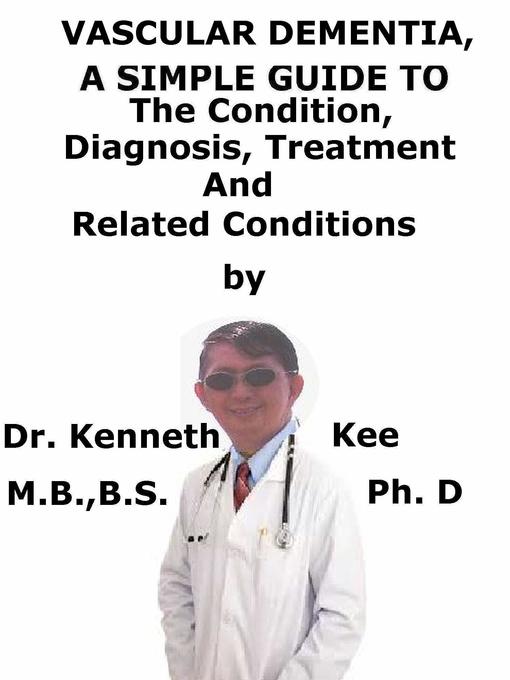This book describes Vascular Dementia, Diagnosis and Treatment and Related Diseases
Vascular dementia is a medical disorder that produces problems with reasoning, planning, judgment, memory and other thought processes caused by brain injury from impaired blood flow to the brain.
The patient can develop vascular dementia after a stroke obstructs an artery in the brain, but strokes do not always produce vascular dementia.
Factors that raise the risk of heart disease and stroke such as diabetes, high blood pressure, high cholesterol and smoking also increase the vascular dementia risk.
Regulating these factors may help reduce the chances of forming vascular dementia.
Frequent disorders that may cause vascular dementia are:
1. Stroke (infarction) obstructing a brain artery
2. Narrowed or chronically damaged brain blood vessels
These disorders are the wear and tear linked with aging, high blood pressure, abnormal aging of blood vessels (atherosclerosis), diabetes, and brain hemorrhage.
Symptoms
Vascular dementia signs and symptoms are:
1. Confusion
2. Trouble paying attention and concentrating
3. Reduced ability to organize thoughts or actions
4. Decline in ability to analyze a situation, develop an effective plan and communicate that plan to others
5. Difficulty deciding what to do next
6. Problems with memory
Diagnosis
Doctors can nearly always diagnose that the patient has dementia, but there is no specific test that verifies the patient has vascular dementia.
The doctor will have to make a judgment about whether vascular dementia is the most likely cause of the symptoms based on the information the patient supplies
Images of the brain with CT and MRI scans can pin down visible abnormalities produced by strokes, blood vessel diseases, tumors or trauma that may cause alterations in thinking and reasoning
Carotid ultrasound can detect the movement of blood through the arteries
Neuropsychological tests assess:
1. Speak, write and understand language
2. Work with numbers
3. Learn and remember information
4. Develop a plan of attack and solve a problem
5. Respond effectively to hypothetical situations
People with vascular dementia may have an exceptionally hard time analyzing a problem and forming an effective solution
Treatment
Treatment often directs on treating the health disorders and risk factors that add to vascular dementia.
Regulating disorders that affect the underlying condition of the heart and blood vessels can occasionally decrease the rate at which vascular dementia gets worse
People with any type of dementia and their caregivers whether it is vascular dementia or Alzheimer's disease have a mixture of emotions, such as confusion, frustration, anger, fear, uncertainty, grief and depression
Vascular Dementia is the second most common dementia after Alzheimer Disease.
It is one of the few reversible dementia that may be improved with early diagnosis and treatment
The risk of Vascular dementia may be reduced by preventing strokes through:
Treatment of underlying vascular causes
1. Lower the blood pressure
2. Reduce the cholesterol level
3. Prevent the blood from clotting and keep the arteries clear
4. Help control the blood sugar if the patient has diabetes
Lifestyle and home remedies
Though these have not been proved to change the course of vascular dementia, the doctor will likely advise that the patient:
1. Do regular physical activity
2. Eat healthy
3. Try to maintain a normal weight
4. Engage in social activities
5. Challenge the...
- Lived experience of Dementia
- Lewy body dementias
- Frontotemporal Dementia
- Younger Onset Dementia
- LGBTI and dementia
- Eating and drinking well
- Activities and Engagement
- Culture, Religion and Spirituality
- End of Life and Palliative Care
- Younger Readers
- See all living with dementia collections
- Caregiving : Support and Guidance
- About Dementia
- Early Stage Dementia
- Communication
- Changes in behaviour
- Grief and Loss
- Relationships, Intimacy & Sexuality
- Residential Care
- See all caregiving collections
- Dementia Care Practice
- Person-Centred Care
- About Dementia
- Dementia Care Therapies
- Pain and Dementia
- Exercise
- Leadership and organisational change
- Elderhood
- Changes in behaviour
- See all healthcare professionals collections
- Dementia Australia resources
- Audiobooks
- Australian content
- Memoir
- Fiction
- Brain health
- Worried About Your Memory?
- Reminiscence and life story work
- Exercise
- Mindfulness & meditation
- Self-care & Wellbeing
- See all featured collections collections
